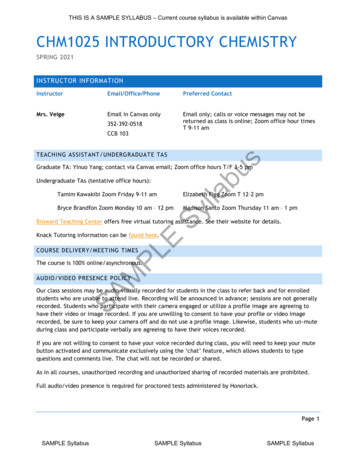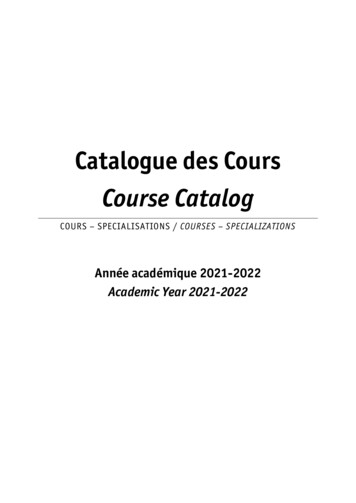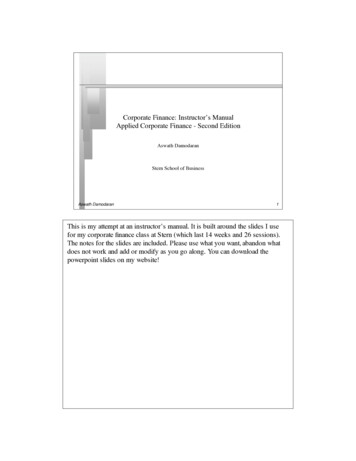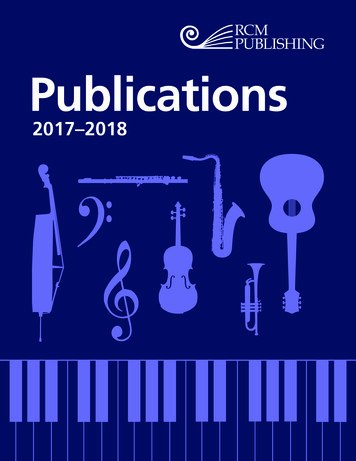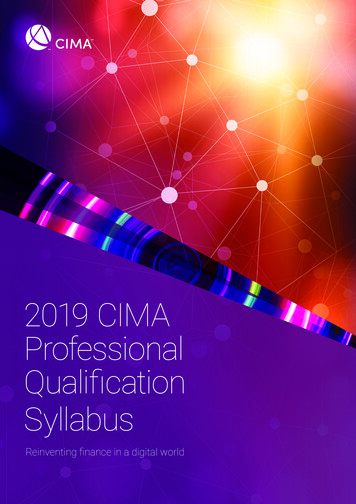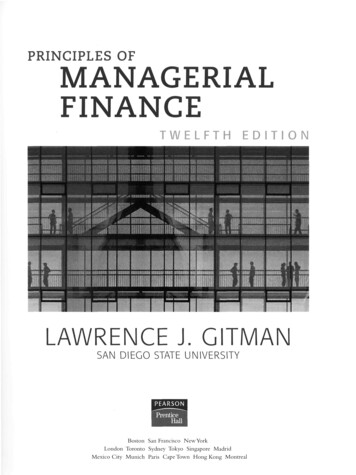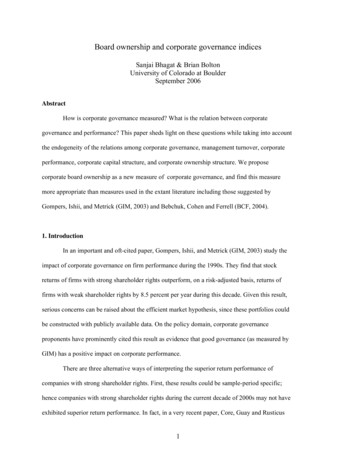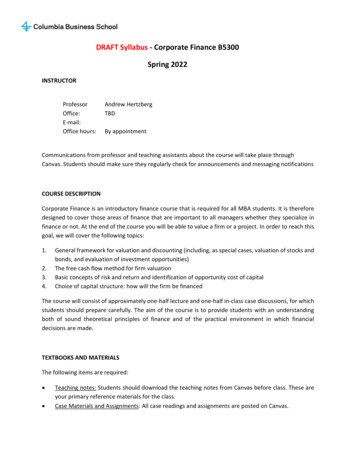
Transcription
DRAFT Syllabus ‐ Corporate Finance B5300Spring 2022INSTRUCTORProfessorOffice:E‐mail:Office hours:Andrew HertzbergTBDBy appointmentCommunications from professor and teaching assistants about the course will take place throughCanvas. Students should make sure they regularly check for announcements and messaging notificationsCOURSE DESCRIPTIONCorporate Finance is an introductory finance course that is required for all MBA students. It is thereforedesigned to cover those areas of finance that are important to all managers whether they specialize infinance or not. At the end of the course you will be able to value a firm or a project. In order to reach thisgoal, we will cover the following topics:1.2.3.4.General framework for valuation and discounting (including, as special cases, valuation of stocks andbonds, and evaluation of investment opportunities)The free cash flow method for firm valuationBasic concepts of risk and return and identification of opportunity cost of capitalChoice of capital structure: how will the firm be financedThe course will consist of approximately one‐half lecture and one‐half in‐class case discussions, for whichstudents should prepare carefully. The aim of the course is to provide students with an understandingboth of sound theoretical principles of finance and of the practical environment in which financialdecisions are made.TEXTBOOKS AND MATERIALSThe following items are required: Teaching notes: Students should download the teaching notes from Canvas before class. These areyour primary reference materials for the class.Case Materials and Assignments: All case readings and assignments are posted on Canvas.
The (optional) textbook is: Corporate Finance: The Core, (5th edition), by Jonathan Berk and Peter DeMarzo (BDM). Suggestedreadings from this book for each lecture are listed in “Schedule of Sessions and Assignments”. I suggestyou do these readings prior to class as a supplement to class lecture material. These additional materialsare not required, but may be useful to some students: An additional detailed treatment of valuation is Valuation: Measuring and Managing the Value ofCompanies, (7th edition) by Tim Koller, Marc Goedhart, and David Wessels (McKinsey & CompanyInc.)The Wall Street Journal and/or The Financial Times are fundamental reading for any business schoolstudent. Class discussion will often reference news items.CLASSROOM NORMS AND EXPECTATIONSStudents are expected to adhere to CBS Core Culture in this class by being Present, Prepared, andParticipating.Laptop computers and other devices – You must bring your laptop to class. You should sign in to Zoom throughCanvas at least 15 minutes before the scheduled start of lecture.
TEACHING ASSISTANTS AND REVIEW SESSIONReview sessions will be held on Friday 8:30am to 10:00am. A schedule of the review sessions and thematerial that will be covered is provided at the end of the syllabus. This includes three excel reviewsessions directed to helping students become efficient at doing valuation in excel. Any materials coveredin review sessions will be posted on Canvas. Our TA team will be responsible for running the reviewsessions, common to all clusters. You can schedule office hours (in the library) with your cluster TA byemail. He/she should be the first point of contact for queries about grading or assignments.Cluster A:TBDCluster B:TBDGRADINGGrades will be calculated using the following weights: Case write‐upsFour Problem SetsFinal ExamParticipation20%20%50%10%Case Write‐upsThe case assignment, excel data, and reading will be available on Canvas at least one week before thecase write‐ups are due.For each case you are required to answer all questions in the “Assignment” portion of the handout. Youdo not need to explicitly answer the discussion questions; they are only intended to give you ideas andprepare you for class discussion.Cases are solved in your learning teams. Each case should be answered in excel. All analysis should besuccinctly and clearly explained within the excel document. It should be clear how your calculations wereperformed. You should list and justify any assumptions you make.Each group will turn in one solution. Case write‐ups should be submitted electronically (an excel file)through the Drop Box in Canvas no later than 15 minutes before the start of the lecture on the day inwhich they are due. Late submission will not be accepted. You should have a copy of assignment answers(electronic or hardcopy) to refer to during class discussion.
Case write‐ups will be graded on a ten‐point scale. The first case write‐up will be graded leniently so thatyou can receive feedback that will help you do your future case write‐ups. Your grade will depend on thelogic of your analysis and the clarity of your write‐up.Problem SetsThere will be four problem sets. You can discuss the concepts related to the problem set with other peoplein your cluster but the answer to the specific questions in your problem set should be your own individualwork. Problem sets should be submitted electronically (an excel file) through the Drop Box in Canvas nolater than 15 minutes before the start of the lecture on the day in which they are due. Late submissionwill not be accepted. Assignments solutions should be clearly explained and formatted to ensure they areeasy to read.Final ExamThe final exam will occur during the exam period at the end of semester. Your primary task in the examwill be a full firm valuation that you will solve in excel. In addition, there will also be short questions testingyour knowledge of finance concepts that are introduced throughout the course. The exam is open bookand notes. You will need your laptop to solve the case. The length of the exam is five hours.All your assignment submissions are subject to the CBS Honor Code. Violations of the CBS Honor Codemay lead to failing the assignment, failing the course, suspension, and/or dismissal. In order to avoidambiguity that may lead to unintentional violations of the Honor Code, assignment description types havebeen standardized and specified below.
TypeDesignationGradePreparation ofsubmissionDiscussion of Submission*Discussion ofConcepts**AGroup WorkBy the groupPermitted to discuss (withingroup)PermittedB1Individual w/ Discussionsof Concepts andSubmissionIndividual w/ Discussionsof Concepts OnlyIndividualSame grade forall groupmembersIndividual gradeB2CIndividualpreparationPermitted to discuss; sharingPermittedsolutions or submission files is notallowedIndividual gradeIndividualNot permitted to share/discussPermittedpreparationsolutions or submissionIndividual gradeIndividualNot permitted to share/discussNotpreparationsolutions or submissionpermitted**** The designated group can be either an assigned study group or a self‐selected one.* Submission means any work and/or output pertaining to the specific assignment. If an assignment submission contains a calculation or decision relatedto a specific set of data and setting, discussing the details how to make this calculation or decision with regard the data/setting is to discuss thesubmission. Providing another student with a draft of the calculation or decision is sharing the submission.** Concepts mean any ideas, examples, readings, or other related materials from the class/course. Conceptual discussion should not be based on aspecific set of data or setting related to a calculation or decision required in the assignment, but could be based on other related examples, preferablythose from class/course materials.*** As no conceptual discussion is permitted, Type C is akin to a take‐home exam.Case write‐ups are “Type A” assignments. Problem sets are “Type B2” assignments
INCLUSION, ACCOMMODATIONS, AND SUPPORT FOR STUDENTSAt Columbia Business School, we believe that diversity strengthens any community or business model andbrings it greater success. Columbia Business School is committed to providing all students with the equalopportunity to thrive in the classroom by providing a learning, living, and working environment free fromdiscrimination, harassment, and bias on the basis of gender, sexual orientation, race, ethnicity,socioeconomic status, or ability.Columbia Business School will make reasonable accommodations for persons with documenteddisabilities. Students are encouraged to contact the Columbia University’s Office of Disability Services forinformation about registration. Students seeking accommodation in the classroom may obtaininformation on the services offered by Columbia University’s Office of Disability Services online html or by contacting (212) 854‐2388.Columbia Business School is committed to maintaining a safe environment for students, staff andfaculty. Because of this commitment and because of federal and state regulations, we must advise youthat if you tell any of your instructors about sexual harassment or gender‐based misconduct involving amember of the campus community, your instructor is required to report this information to a Title IXCoordinator. They will treat this information as private, but will need to follow up with you and possiblylook into the matter. Counseling and Psychological Services, the Office of the University Chaplain, and theOmbuds Office for Gender‐Based Misconduct are confidential resources available for students, staff andfaculty. “Gender‐based misconduct” includes sexual assault, stalking, sexual harassment, dating violence,domestic violence, sexual exploitation, and gender‐based harassment. For more information, d‐misconduct‐policy‐students.
SCHEDULE OF SESSIONS AND ASSIGNMENTS (Dates to be updated for Spring 2022 Schedule)
SCHEDULE OF REVIEW SESSIONS (Dates to be updated for Spring 2022 910/3011/1311/2012/412/1112/141234567891011Review Session Content* (Excel Review Sessions in Bold)Excel Review I: Discounting in Excel (PV, NPV, IRR)Review of Problem Set 1 and Chocolat Cordon Rouge CaseExcel Review II: Projecting FCFs w/ RatiosReview of Clarkson CaseReview of Problem Set 2 and 3Review of CAPM, WACC, Leverage and Project RiskReview of American Chemical CaseExcel Review III: Valuation in Excel OCSReview of PS 4Review of Hospital Corporation of America and Soul CycleExam Review*Normal Review Session Time (Virtual): Friday 8:30am ‐ 10:00am* Final Exam Study Day Review Session: Monday Dec 14th, Time TBD
Corporate Finance is an introductory finance course that is required for all MBA students. It is therefore . Counseling and Psychological Services, the Office of the University Chaplain, and the Ombuds Office for Gender‐Based Misconduct are confidential resources available for students, staff and . F 10/2 4 Review of Clarkson Case F 10/9 .


